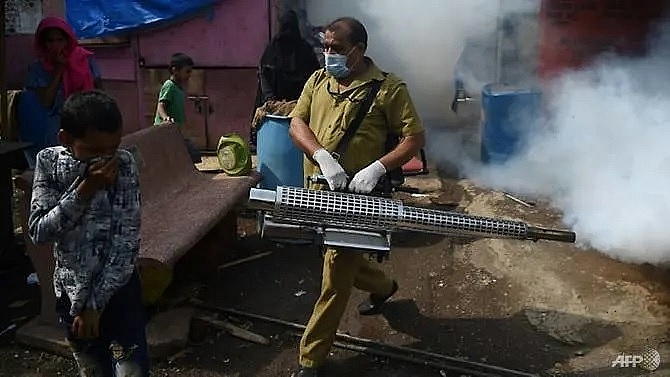Virus-hit India's overwhelmed health workers brace for monsoon
 |
| Every year illnesses such as dengue fever and malaria infect more than half a million people and kill hundreds in India. (Photo: AFP/Punit PARANJPE) |
Every year illnesses such as dengue fever and malaria infect more than half a million people and kill hundreds in India as the monsoon brings much-needed rain but also devastation and disease.
With more than three decades of experience as a doctor in India's chronically underfunded public healthcare system, Vidya Thakur – medical superintendent at Mumbai's Rajawadi Hospital – is used to managing "heavy burdens".
But now, she says, "COVID-19 has left us helpless ... and the monsoon will make things even more difficult."
Every bit of space at the 580-bed state-run hospital where she works is already devoted to dealing with the pandemic. Beds crowd corridors, storage rooms function as wards and staff are overworked.
At Mumbai's massive Lokmanya Tilak Municipal General Hospital, better known as Sion, undergraduates have been drafted into service, medical resident Shariva Ranadive told AFP.
Many experienced doctors and nurses are staying on the sidelines because they are vulnerable to the virus due to their age or pre-existing conditions such as diabetes.
"Everyone is working constantly ... we are overwhelmed," Thakur told AFP.
And now with the monsoon having arrived in Mumbai on its months-long journey northwards, she is readying for the usual rush of seasonal ailments.
A particular problem is that many seasonal illnesses have symptoms that are virtually indistinguishable from COVID-19, such as fever, breathing difficulties and loss of appetite.
This means more testing, more isolation beds and more protective equipment will be needed to ensure that patients are diagnosed correctly and not exposed to the coronavirus too.
"We will need to treat everyone as if they were a COVID-19 patient," said Thakur. "Every precaution will have to be taken."
DELAYED EFFORTS, DOUBLE SHIFTS
Healthcare workers are not the only ones battling exhaustion.
A months-long lockdown to prevent the epidemic from spreading left Mumbai with an acute shortage of sanitation workers.
Thousands of public health workers who fumigate neighbourhoods to kill disease-carrying mosquitoes had to delay those crucial efforts for two months to focus on sanitation instead.
"Many of our men are doing double shifts, working 14 hours straight," said Rajan Naringrekar, the head of the city's insecticide department.
With nearly 60,000 infections, Mumbai accounts for around a fifth of India's COVID-19 cases.
As teams fumigated a slum and cleared out stagnant water – a potent breeding ground for mosquitoes – from sagging tarpaulin roofs, storage bins and bottles, Naringrekar told AFP many of them were afraid of contracting the virus.
The risks will increase exponentially with the rains, with workers required to inspect homes and offices in case of a dengue outbreak.
"We are obviously worried but we have to do our job and take as many precautions as we can," he said, pointing to the gloves and masks worn by the workers.
MONSOON TRAUMA
Their fears are shared by millions living in slums across India, who say their homes offer little protection against the coronavirus or other diseases.
For Mumtaz Kanojia, who lives in a small one-room house with her son and daughter, the memory of her bone-chilling three-week-long bout with malaria still haunts her 10 years on.
"My daughter and I were severely ill, we had fever, we couldn't eat anything. She even fainted at one point," the 53-year-old told AFP.
Kanojia is already fearful of contracting COVID-19, and the onset of the monsoon prompts further dread – of flooding outside her front door, a leaking ceiling, contaminated drinking water and deadly diseases.
"The water gets everywhere ... and the mosquitoes follow," she said, adding that she and her neighbours had little choice but to use tarpaulins as makeshift coverings despite the risk they could become breeding grounds.
"Without it, the roof leaks every time there's a heavy downpour," she said.
"Each time, we have to take care of it ourselves. No one from the government ever comes to help."
What the stars mean:
★ Poor ★ ★ Promising ★★★ Good ★★★★ Very good ★★★★★ Exceptional
 Tag:
Tag:
Related Contents
Latest News
More News
- Russian President congratulates Vietnamese Party leader during phone talks (January 25, 2026 | 09:58)
- Worldwide congratulations underscore confidence in Vietnam’s 14th Party Congress (January 23, 2026 | 09:02)
- Political parties, organisations, int’l friends send congratulations to 14th National Party Congress (January 22, 2026 | 09:33)
- 14th National Party Congress: Japanese media highlight Vietnam’s growth targets (January 21, 2026 | 09:46)
- 14th National Party Congress: Driving force for Vietnam to continue renewal, innovation, breakthroughs (January 21, 2026 | 09:42)
- Vietnam remains spiritual support for progressive forces: Colombian party leader (January 21, 2026 | 08:00)
- Int'l media provides large coverage of 14th National Party Congress's first working day (January 20, 2026 | 09:09)
- Vietnamese firms win top honours at ASEAN Digital Awards (January 16, 2026 | 16:45)
- ASEAN Digital Ministers' Meeting opens in Hanoi (January 15, 2026 | 15:33)
- ASEAN economies move up the global chip value chain (December 09, 2025 | 13:32)






















 Mobile Version
Mobile Version